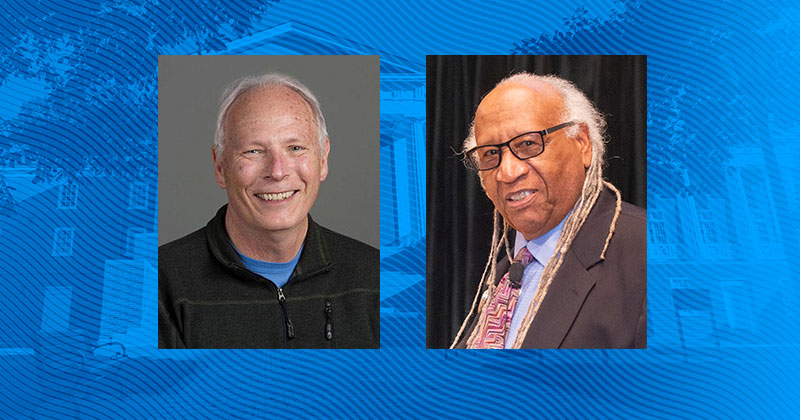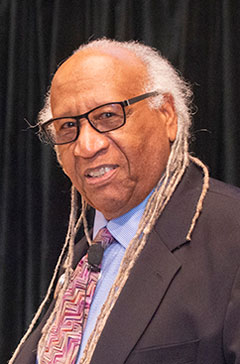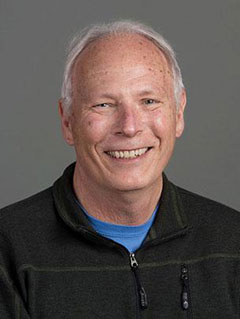


In recognition of distinguished original research
Graphic by Jeffrey C. Chase, photos by Wenbo Li and courtesy of University of Chicago May 10, 2023
James M. Jones, Anthony M. Kossiakoff elected to National Academy of Sciences
Two distinguished scholars with University of Delaware ties have been elected to the National Academy of Sciences “in recognition of their distinguished and continuing achievements in original research.”
Honored were James M. Jones, Trustees’ Distinguished Professor Emeritus of Psychological and Brain Sciences and Africana Studies and founding director of the Center for the Study of Diversity, and alumnus Anthony A. Kossiakoff, Otho S.A. Sprague Distinguished Service Professor of Biochemistry and Molecular Biology at the University of Chicago.
James M. Jones

A member of the UD faculty since 1981, Jones published the first edition of Prejudice and Racism in 1972, with a second edition issued in 1997. The work is widely regarded as a classic analysis of race, class and culture in psychology. He published The Psychology of Diversity: Beyond Prejudice and Racism, with Jack Dovidio and Deborah Vietze in 2014.
“I was quite surprised and pleased that my work over my 50-plus year career is considered worthy of membership in the National Academy of Sciences,” Jones said. “My first book on prejudice and racism examined the multilevel nature of racism from individuals, to institutions, to the entire culture. My argument for these interconnected levels of self-perpetuated bias presaged what we now commonly call systemic racism. I think this analysis which I have elaborated on during my career is what the electors thought was worthy of academy membership.”
The former executive director for public interest and director of the Minority Fellowship Program at the American Psychological Association, Jones is past president of the Society of Experimental Social Psychology and the Society for the Psychological Study of Social Issues.
In 2018, the University of Delaware honored Jones with an honorary doctor of science degree in recognition of his ”lifetime researching human diversity and how it affects every aspect of our existence, from issues of power and social justice to those of psychological and cultural health.”
His other honors include the 1999 Lifetime Achievement Award of the Society for the Psychological Study of Ethnicity, Culture and Race; the 2001 Kurt Lewin Award and the 2009 Distinguished Service Award by the Society for the Psychological Study of Social Issues; the 2007 Distinguished Psychologist Award by the Association of Black Psychologists; the 2011 Lifetime Contribution to Psychology Award from the American Psychological Association; the 2018 Gold Medal Award for Life Achievement in Psychology in the Public Interest; and the 2018 Morton Deutsch Award for Distinguished Contributions in Social Justice form the International Center for Cooperation and Conflict Resolution at Columbia Teachers College.
Anthony M. Kossiakoff

An early leader in biotherapeutics, Kossiakoff, who earned his Ph.D. in physical chemistry at UD in 1972, started his career at Brookhaven National Laboratory and went on to become a pioneering member of the biotechnology corporation Genentech Inc. He chaired the Department of Biochemistry and Molecular Biology at the University of Chicago from 1998-2011.
“Looking back, I was encouraged to take chances and Brown Lab was the site of many early ‘crash and burns,’ Kossiakoff said. “However, in the end, I’ve always appreciated how well prepared I was to be able to jump into entirely new fields as my research interests evolved. I wouldn’t change a thing.”
In announcing his recent honor, University of Chicago News called him “a structural biologist and protein engineer whose research group is developing a molecular understanding of how molecular recognition governs virtually all aspects of biological function. He did pioneering work towards elucidating the mechanisms involved in hormone-induced receptor activation and regulation.”
The article also notes that his group “has also pioneered a new technology called “chaperone-assisted” structure determination, which has facilitated the structural analyses of protein systems that had been intractable by other approaches” and has been “at the forefront of developing synthetic antibodies, which are more powerful than traditional monoclonal antibodies and have the potential to replace them for uses as biotherapeutics and in cell biological applications.”
In 2003, Kossiakoff was elected to UD’s Alumni Wall of Fame, which honors alumni from around the nation and the world who have distinguished themselves in professional and community endeavors.
He returned to his alma mater in 2012 to deliver the annual John C. Wriston Memorial Lecture, and in 2019 he spoke at a biopharmaceutical symposium, hosted by the Delaware Biotechnology Institute on the STAR Campus.
Among his other honors, he received an honorary doctor of science degree from his undergraduate alma mater Davis and Elkins College in 2011 and was named a fellow of the American Association for the Advancement of Science in 2012.
About the National Academy of Sciences
Other current members of the UD community in the National Academy of Sciences are Norman Ness, professor emeritus of physics, and alumni Arup K. Chakraborty, who earned his Ph.D. in chemical engineering in 1988; Thomas A. Henzinger, who earned his master’s degree in computer and information sciences in 1986; and Nancy R. Sottos, who earned her bachelor’s and doctoral degrees in mechanical engineering in 1986 and 1991, respectively.
The National Academy of Sciences is a private, nonprofit institution established under a congressional charter signed by President Abraham Lincoln in 1863. It recognizes achievement in science by election to membership, and—with the National Academy of Engineering and the National Academy of Medicine—provides science, engineering and health policy advice to the federal government and other organizations. This month the academy announced the election of 120 members and 23 international members, bringing the total number of active members to 2,565 and the total number of international members to 526.
Contact Us
Have a UDaily story idea?
Contact us at ocm@udel.edu
Members of the press
Contact us at 302-831-NEWS or visit the Media Relations website

